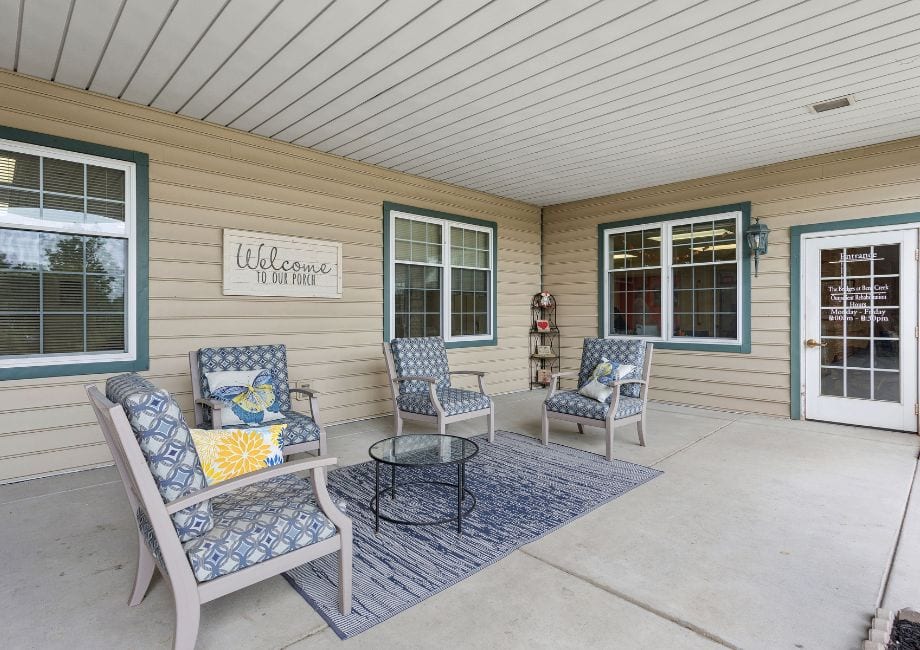It’s natural to feel overwhelmed if you suspect your parent has dementia. This is a challenging time filled with many emotions. Be kind to yourself, and remember that compassion, patience, and understanding are key.
While there’s no single right answer (every family is different), learning more about dementia can help you navigate this journey. You don’t have to go through this alone. Seeking professional guidance early can be incredibly helpful. This might involve:
- Learning more about memory care in senior living communities.
- Connecting with experienced individuals who can share insights and support.
These first steps can empower you to make informed decisions for your loved one and yourself.
What Is Dementia?
Dementia is an umbrella term for a decline in cognitive functioning that affects memory, thinking, behavior, and the ability to perform daily activities. Dementia is not a normal part of aging and can be caused by various diseases or injuries that affect the brain.
Alzheimer’s disease is the most common form of dementia, accounting for up to 80% of cases. But other forms of dementia, such as vascular dementia, Lewy body dementia, and frontotemporal dementia, each present their own unique challenges.
Noticing the early signs of dementia in a loved one can be a significant change in itself. You might start noticing things like forgetfulness, difficulty finding the right words, or changes in mood and personality in your parent. These signs may initially seem like aging’s natural course, but they could indicate a more serious issue.
The Importance of Early Detection
Early detection of dementia is pivotal. While it might not change the diagnosis, it gives you and your loved one the greatest advantages in managing symptoms and planning for the future. Early intervention can also open up more options for treatment and support, making a significant difference in your loved one’s quality of life.
How to Proceed If You Suspect Dementia
Talking to a loved one about possible dementia can be challenging. It’s natural to feel anxious, but open communication is vital. Here are some tips:
- Choose a calm and private setting. Maybe it’s their favorite chair at home or a quiet corner in a park.
- Lead with love and concern. Express your worry about their well-being and recent changes you’ve noticed.
- Focus on specific examples. Mention instances of forgetfulness or confusion that have concerned you.
- Offer support and next steps. Let them know you’re there for them, and suggest scheduling a doctor’s visit together.
Seeking Professional Help
Acknowledging possible dementia is the hardest step. But once you do, seeking professional help is crucial.
Doctors with experience in senior care or neurology can provide a thorough evaluation and diagnosis if necessary.
Support groups can offer a community that understands your experience and helps ensure you’re not alone.
Planning for the Future
As you care for your parent, it’s important to consider legal and financial matters. This might involve creating documents like a power of attorney, a will, or a living trust.
These documents help ensure your parent’s wishes are respected, their finances are managed effectively, and their legacy is protected. They are a way to show respect and care for their future well-being.
Taking Care of Yourself
Providing love and care for someone with dementia is a noble act, but it can be demanding.
Taking care of your own physical and mental well-being is not a luxury—it’s a necessity. By staying strong and healthy, you’ll be better equipped to offer the loving care your parent needs.
Creating a Personalized Care Plan
Creating a comprehensive care plan is vital for ensuring your parent receives the right level of care. This plan should be tailored to their specific situation, including:
- Progression of their disease: Consider how dementia might progress and adjust the plan accordingly.
- Preferred care: Outline their preferences for in-home care, assisted living, or other options.
- Living arrangements: Consider their comfort and safety when choosing a living situation.
- Medical treatment: Discuss their wishes regarding future medical decisions.
This personalized plan becomes a roadmap for their care journey, honoring their life story and choices every step of the way.
Coping Strategies for Families
Supporting a loved one with dementia requires patience, love, and understanding. Here are a few strategies to help you and your family:
- Learn more about dementia: Understanding what to expect can help alleviate some anxiety.
- Create a supportive environment: Make your home safe and comfortable for your parent and establish a routine to help them feel secure.
- Protect your well-being: Remember, looking after yourself is not selfish. Self-care is crucial to be able to care for others.

A Journey Taken Together
Facing dementia as a family can be challenging, but it’s also an opportunity to come together, support each other, and make every moment matter. Remember, you are not alone; countless resources and communities are ready to help you on this path.
The Bridges at Bent Creek is a Lilac Trace Memory Care neighborhood. Our highly trained staff provide specialized care and support that honors the unique needs of those with cognitive disorders like Alzheimer’s or dementia.
Call us today to schedule a visit to our community and see how we can help.










